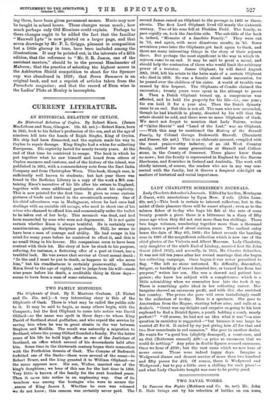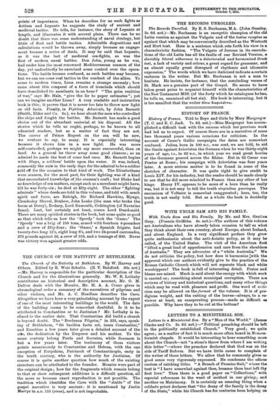TWO NAVAL WORKS.
In Famous Sea Fights (Methuen and Co. 6s. net) Mr. John R. Hale brings out by his selection of battles on sea some, points of importance. When he describes for us such fights as Actium and Lepanto be suggests the study of ancient and medieval tactics. He tells, for instance, the story of Lepanto at length, and illustrates it with several plans. There can be no doubt that there was some understanding of naval strategy, but little of fleet and battle tactics. Admirable dispositions and calculations would be thrown away, simply because an engage- ment became a series of duels. It may be said that Lepanto, as it was the last of medieval sea-fights, so was the first of modern naval battles. Don John, young as he was, had under him the most renowned Mediterranean seamen of the day, yet undoubtedly he exercised some control over the opera- tions. The battle became confused, as such battles may become, but we can see some real tactics in the conduct of the allies. To come to modern times, Lissa remains a strange anomaly ; how came about this conquest of a force of ironclads which should have demolished its assailants in an hour ? "The grim realities of war," says Mr. Hale, "give the lie to paper estimates"; yet can we imagine another Lissa ? A very readable and instructive book is this ; it proves that it is never too late to throw new light on old facts. Finally, in Fighting Admirals, by John Barnett (Smith, Elder and Co. 6s.), we hear about the men who controlled the ships and fought the battles. Mr. Barnett has made a good choice out of the abundant material at his disposal. All the stories which he tells us ought, perhaps, to be known to all educated readers, but as a matter of fact they are not. The career of Prince Rupert on the sea will be new, we venture to say, to many. It is especially interesting because it shows him in a new light. He was more self-controlled, perhaps we might say more resourceful, than on land. As a general he threw away some good chances ; as an admiral he made the best of some bad ones. Mr. Barnett begins with Slays, a soldiers' battle upon the water. It was, indeed, commonly the rule in the early days for the admiral to be a soldier told off for the occasion to that kind of work. The Elizabethans were seamen, for the most part, for their fighting was of a kind that necessitated knowledge of the seaman's craft; but Blake had no knowledge of sea matters, except such as a merchant might have, till he was forty-six ; he died at fifty-eight. The other "fighting admirals " whose deeds are told in this volume, and told with much spirit and force, are Raleigh, Sir Richard Hawkins, Myngs, Cloudesley Shovel, Benbow, John Lesko (the man who broke the boom at Derry), Rodney, Lord Exmouth, Codrington (of Navarino fame). Last, but certainly not least, comes Lord Dundonald. There are many spirited stories in the book, but none quite so good as that which tells us how the ' Speedy' took the 'Game.' The ' Speedy ' was a brig of 158 tons, armed with fourteen 4-pounders and a crew of fifty-four; the 'Game,' a Spanish frigate, had twenty-two long 12's, eight long 8's, and two 24-pound carronades, 376 pounds against 56, a crew of 319, and a tonnage of 600. Never was victory won against greater odds.































































 Previous page
Previous page